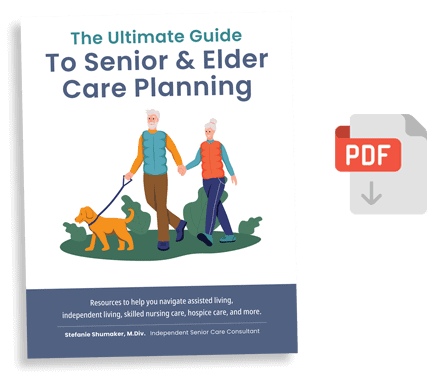The Ultimate Guide To Senior & Elder Care Planning
 By Stefanie Shumaker, M.Div.
By Stefanie Shumaker, M.Div.
Chapter 3: How to determine what type of care your loved one really needs
The information we can gather during face-to-face visits with doctors has become more crucial as doctor appointments are limited amidst this pandemic. It may take months to get in for an appointment, making it critical that you ask the right questions to move forward in planning for your loved one’s future. Ask your loved one if you can go with them to their next doctor appointment. While there, these are some questions you may want to ask the doctor:
• What do you observe?
• Is my loved one declining physically or cognitively?
• What are some of the challenges you think he or she may experience in the future?
• Does he or she qualify for any type of home care? Home health or hospice?
If the doctor believes your loved one may qualify for home health or hospice care, you will need a doctor’s order to contact a care company for an assessment. You should ask for the order during the doctor’s visit, otherwise it may require scheduling another appointment to obtain it at a later date. If you believe your parent is mentally incompetent due to cognitive decline, this may also be something to address with his or her doctor. A clinician’s observation or perspective described in a letter just might be the verification you will need to move forward in decision making on your loved one’s behalf.
You should be concerned about your elderly parent if he or she exhibits increased confusion and forgetfulness, or repetition in conversation. Your loved one may not be eating the food in the refrigerator or may not be bathing. He or she might be somewhat irrational or showing signs of paranoia. All of these things are a sign that it is becoming increasingly difficult for your parent to live alone or care for oneself. If you create space for your loved one to express feelings and talk about his or her situation first, your simple act of listening might give you the ability to guide them forward in a healthy way. If you are unable to move forward with this conversation, you may want to request the help of your parent’s doctor as this person has established trust and may be able to assist. Sometimes these tough conversations are more productive when led by a third person, as observed in the countless family meetings I have led with my hospice patients and their families. Please contact me to learn more about a family meeting and consultation.


